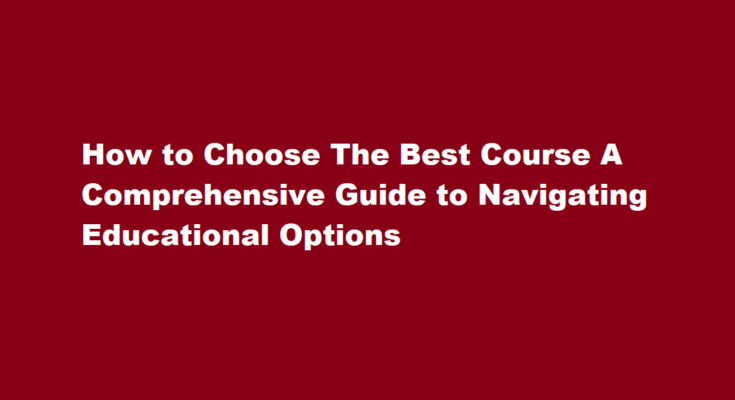Introduction
In today’s fast-paced and ever-evolving world, selecting the best course can be a daunting task. Whether you are a recent high school graduate or a professional seeking to enhance your skills, making the right choice is crucial for your personal and professional growth. This article aims to provide a comprehensive guide to help you navigate through the myriad of educational options available and find the perfect course that aligns with your interests, goals, and aspirations.
Self-Reflection
Before diving into the sea of course offerings, take a moment for self-reflection. Understand your passions, strengths, and weaknesses. Identify your long-term goals and aspirations. Consider what truly excites you and what kind of career path you envision for yourself. Self-awareness is the foundation upon which you can build a successful course selection.
Research the Job Market
While choosing a course, consider the current and future demand in the job market. Research industries that interest you and identify the skills and qualifications required for success in those fields. This will give you insight into the courses that are most valued by employers and increase your chances of landing a rewarding job after completing your studies.
Accreditation and Reputation
Ensure that the courses you consider are accredited by reputable educational institutions or accreditation bodies. Accreditation ensures that the course meets specific quality standards and is recognized by employers and other educational institutions. Additionally, research the reputation of the institution offering the course, as it can significantly impact the value of the certification you receive.
Course Content and Curriculum
Carefully review the course content and curriculum to ensure that it aligns with your learning objectives. Check if the course covers the topics that interest you and provides hands-on practical experience. Look for courses that strike a balance between theoretical knowledge and real-world application.
Mode of Learning
Consider the mode of learning that suits your needs and preferences. Traditional classroom-based learning, online courses, blended learning, or self-paced programs each have their advantages and limitations. Choose the one that complements your learning style and fits well with your schedule and commitments.
Course Duration and Flexibility
Evaluate the course duration and flexibility. Some courses may span a few weeks, while others may take several months or even years to complete. Factor in your personal circumstances, such as financial commitments and family responsibilities, and choose a course that you can comfortably accommodate within your life’s constraints.
Faculty and Support
The expertise and experience of the course instructors can significantly impact the quality of education you receive. Research the faculty’s qualifications, industry experience, and teaching methods. Additionally, inquire about the support services offered by the institution, such as academic advisors and career counselling.
Alumni Success and Placement
The success of previous course participants is a good indicator of the course’s effectiveness. Research the track record of alumni to see if they have been able to secure promising careers in their chosen fields after completing the course. Good institutions often have a robust network of employers and provide assistance with job placements.
Cost and Financial Aid
Consider the financial aspect of the course and assess whether it fits within your budget. Explore scholarships, grants, or other forms of financial aid that may be available to support your education. Remember to evaluate the return on investment the course is likely to offer in terms of future career prospects and earnings potential.
Reviews and Testimonials
Seek out reviews and testimonials from current and former students of the course. Hearing about their experiences can provide valuable insights into the course’s strengths and weaknesses, helping you make a well-informed decision.
FREQUENTLY ASKED QUESTIONS
Which course is No 1?
1. Bachelor’s in Business Administration and Masters in Business Administration BBA/MBA. Management courses are one of the finest degree courses in India today. The graduates of this course have diverse job scope and it is not just limited to India, but spread at international levels.
How do I choose the best course for me?
The most important consideration when choosing your course is asking yourself why you are looking to study. Do you want to further your career by extending your skill set? If this is the case you should choose a course in a subject that is a natural progression of your existing skills and qualifications.
Conclusion
Choosing the best course is a significant decision that can shape your future. By engaging in self-reflection, researching the job market, considering accreditation and reputation, evaluating course content and flexibility, and examining faculty support, you can make a confident and informed choice. Remember, the best course for you is one that aligns with your passions, goals, and aspirations, paving the way for a successful and fulfilling career ahead.
Read Also : Correcting Wrong Words A Guide to Enhancing Communication and Language Accuracy



